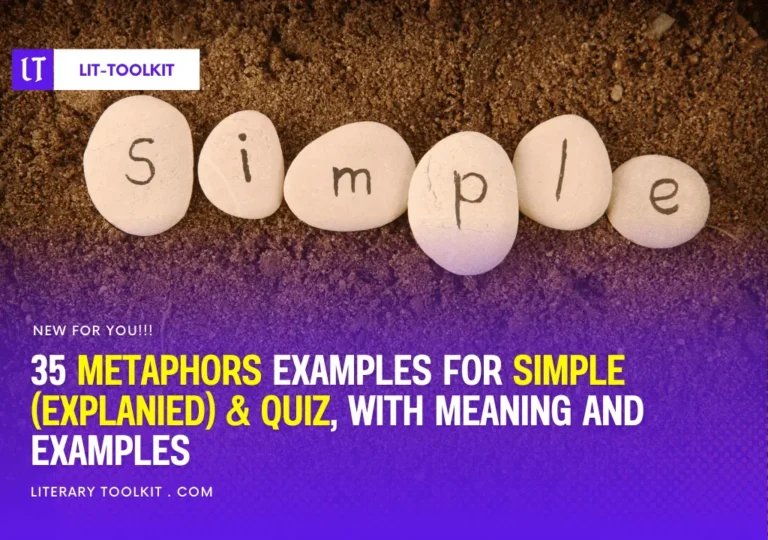It’s interesting to see how we can use different comparisons to really get a handle on an idea like “simple,” isn’t it? In this exploration, we’re diving into various metaphors that paint a picture of what “simple” truly means. We’ll look at quick, everyday comparisons, some more detailed analogies, how simplicity contrasts with difficulty, and even how it’s expressed in the world of literature, all to make this fundamental concept clearer and more relatable.
Here is the list of the metaphor examples we’ve covered:
- Simple is a straight line.
- Simple is an open door.
- Simple is a quiet room.
- Simple is a clear sky.
- Simple is a single step.
- Simple is a basic recipe.
- Simple is a smooth path.
- Simple is calm water.
- Simple is a gentle breeze.
- Simple is a plain truth.
- Simple is a fundamental block.
- Simple is a seed.
- Simple is a direct answer.
- Simple is a clear lens.
- Simple is a master key.
- Simple is a fresh start.
- Simple is a core idea.
- Simple is a clean slate.
- Simple is a well-drawn map for navigating a city.
- Simple is the clean architecture of a perfectly designed tool.
- Simple is the source code of an elegant algorithm.
- Simple is the unpolluted spring water at the mountain’s source.
- Simple is the alphabet; hard is the intricate novel.
- Simple is the shore; hard is the uncharted ocean.
- Simple is the key; hard is the locked treasure chest.
- Simple is the clear path; hard is the dense, polluted forest.
- Simple is the fable’s concise moral.
- Simple is the directness of a declarative sentence.
- Simple is the haiku’s distilled observation.
- Simple is the folk song’s recurring refrain.
Short Metaphors For Simple
1. Simple is a straight line.
Meaning: It represents the most direct and unswerving path between two points.
Example: The assembly instructions followed a simple, straight line approach.
2. Simple is an open door.
Meaning: It signifies easy access and a lack of obstruction.
Example: For her, understanding the concept was like walking through an open door.
3. Simple is a quiet room.
Meaning: It offers clarity and freedom from distracting complexities.
Example: His explanation was a quiet room for my noisy thoughts.
4. Simple is a clear sky.
Meaning: It denotes an absence of obscurity or confusion.
Example: The solution became visible, like a clear sky after a storm of doubts.
5. Simple is a single step.
Meaning: It indicates the most elementary action required to begin.
Example: Starting the project was a single step: just writing the first sentence.
6. Simple is a basic recipe.
Meaning: It involves fundamental ingredients and straightforward instructions.
Example: The code was a basic recipe, easy for anyone to follow and replicate.
7. Simple is a smooth path.
Meaning: It suggests a journey free of obstacles and difficulties.
Example: Learning the new software was a smooth path thanks to its intuitive design.
8. Simple is calm water.
Meaning: It reflects tranquility and an undisturbed, easily understandable state.
Example: His demeanor was calm water, making complex negotiations feel straightforward.
9. Simple is a gentle breeze.
Meaning: It brings effortless movement and refreshing ease.
Example: The task felt like a gentle breeze after the previous complicated challenges.
10. Simple is a plain truth.
Meaning: It is an unembellished fact, easy to recognize and accept.
Example: The data revealed a plain truth about the company’s performance.
11. Simple is a fundamental block.
Meaning: It represents the most essential unit upon which other things are built.
Example: Understanding this one concept is the fundamental block for the entire theory.
12. Simple is a seed.
Meaning: It contains the essence of something much larger, yet is complete in its elemental form.
Example: The idea was a seed, containing the potential for a vast project.
13. Simple is a direct answer.
Meaning: It provides information clearly without evasion or unnecessary detail.
Example: He gave a direct answer, cutting through the confusion.
14. Simple is a clear lens.
Meaning: It allows one to see things as they are, without distortion.
Example: Her perspective was a clear lens, showing the core of the issue.
15. Simple is a master key.
Meaning: It provides access or solutions to multiple related problems.
Example: The formula was a master key, unlocking several perplexing equations.
16. Simple is a fresh start.
Meaning: It offers an uncomplicated beginning, free from previous complexities.
Example: Decluttering his workspace felt like a fresh start for his productivity.
17. Simple is a core idea.
Meaning: It is the central, most elementary concept from which others develop.
Example: The core idea of the campaign was easy for everyone to grasp.
18. Simple is a clean slate.
Meaning: It offers a new beginning without the baggage of prior complications.
Example: The system reboot provided a clean slate, removing all previous errors.
Extended Metaphors for Simple
19. Simple is a well-drawn map for navigating a city.
Meaning: It provides clear, essential pathways and landmarks, omitting overwhelming details to guide a user effectively from origin to destination without confusion. Such a map prevents one from getting lost in the urban pollution of excessive information.
Example: The project plan was a well-drawn map, clearly outlining each phase towards completion, unlike chaotic plans that resemble a polluted, unreadable chart.
20. Simple is the clean architecture of a perfectly designed tool.
Meaning: Every component serves a distinct, necessary purpose, and there are no superfluous parts; its form follows its function with transparent efficiency, making it easy to understand and use. Its design avoids the “feature pollution” that complicates many modern devices.
Example: The new software interface is the clean architecture of a perfectly designed tool; its intuitiveness stands in stark contrast to the confusing design of its predecessor.
21. Simple is the source code of an elegant algorithm.
Meaning: It achieves a complex task with a minimal number of operations and clear logic, making it easy to understand, debug, and maintain. Its efficiency is beautiful in its straightforwardness, avoiding the “code pollution” of redundant or overly complicated scripting.
Example: The professor praised the student’s work as the source code of an elegant algorithm, highlighting its clarity and efficiency in solving the problem.
Metaphors for Simple and Hard
22. Simple is the unpolluted spring water at the mountain’s source.
Meaning: It is pure, direct, and fundamental, providing the essential basis without added complexities or contaminants. This clarity is its strength, before any downstream pollution alters its nature.
Example: His explanation was like unpolluted spring water; it was pure, direct, and quenched the thirst for understanding immediately, unlike convoluted explanations muddied by jargon.
23. Simple is the alphabet; hard is the intricate novel.
Meaning: Simple represents the fundamental building blocks, while hard represents the complex construction derived from them.
Example: Learning the basic moves was simple as the alphabet; mastering the entire game was hard as writing a novel.
24. Simple is the shore; hard is the uncharted ocean.
Meaning: Simple is the known, accessible, and safe starting point, while hard is the vast, unknown, and challenging expanse.
Example: Understanding the problem statement was simple as the shore; finding the innovative solution felt like navigating an uncharted ocean.
25. Simple is the key; hard is the locked treasure chest.
Meaning: Simple represents the tool or method for access, while hard represents the valuable but secured objective.
Example: The formula was the simple key; applying it correctly to the complex dataset was the hard part of opening the treasure chest of insights.
Metaphors for Simple in Literature
26. Simple is the clear path; hard is the dense, polluted forest.
Meaning: Simple offers an easy-to-follow route, while hard presents an environment obscured by numerous obstacles and confusing elements, much like a forest choked with the pollution of tangled undergrowth.
Example: Sticking to the basic plan was the simple, clear path; deviating into undocumented features turned the project into a dense, polluted forest of complications.
27. Simple is the fable’s concise moral.
Meaning: In literature, a fable often uses a straightforward narrative to deliver a clear, unambiguous lesson or truth.
Example: The CEO’s advice was like a fable’s concise moral: focus on the core product.
28. Simple is the directness of a declarative sentence.
Meaning: Literary simplicity can be found in sentence structures that state facts or ideas plainly without elaborate clauses or inversions.
Example: Her writing style emulated the simple directness of a declarative sentence, conveying information with utmost clarity.
29. Simple is the haiku’s distilled observation.
Meaning: This poetic form captures a moment or an idea with extreme brevity and clarity, focusing on essential imagery.
Example: His summary of the complex report was like a haiku’s distilled observation: brief, yet insightful.
30. Simple is the folk song’s recurring refrain.
Meaning: A recurring, easily remembered phrase or melody in folk music often carries the song
Example: The core message of their campaign became simple as a folk song’s recurring refrain, easily remembered by all.

